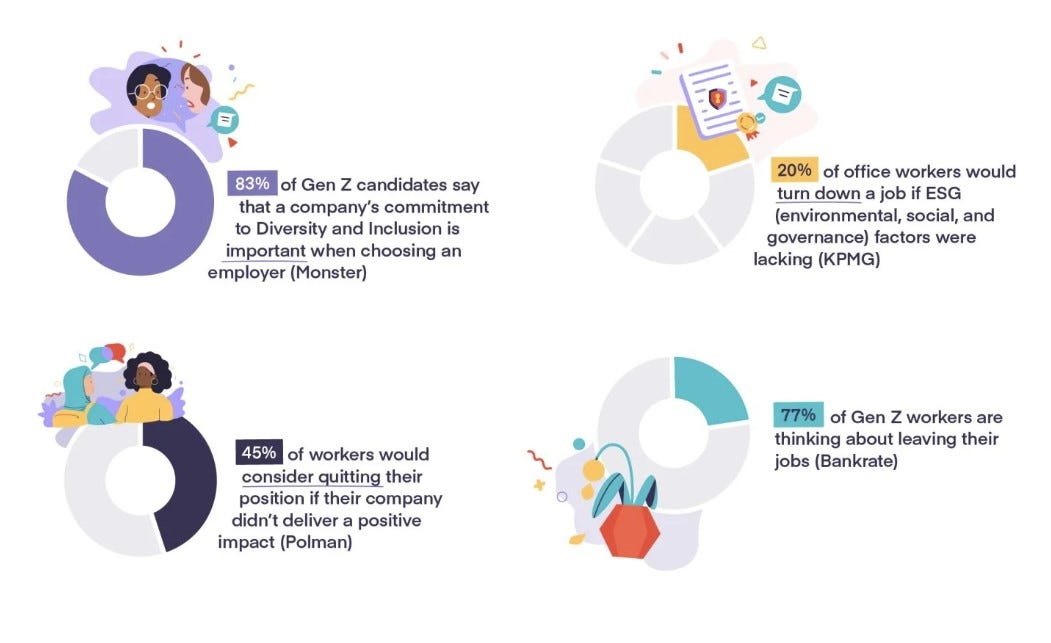Voting with your wallet - Can it save the world?
Exploring how our money can be a powerful tool to enact the change we want to see in the world. Earn, save, invest and spend in line with your values to build the world you want to live in.
Are you feeling helpless looking at the state of the world right now? It seems many of us are and there’s an overwhelming sense that things will only get worse. As our governments and corporations continually fail to listen to the will of the people, putting profit above people and planet. Month after month, hundreds of thousands march in the streets of cities around the world, demanding a ceasefire in the middle east - our governments continue to provide arms to war criminals, followed by aid to the millions of innocent civilians affected (make it make sense). Our politicians show face at COP summits to make promises on climate, only to roll them back to appease the bottom line of global corporations - meanwhile non-violent climate justice protestors are arrested and jailed for longer than some convicted rapists. The biggest economy and most influential power in the world, has effectively removed millions of women’s rights to autonomy over their own bodies, using abortion rights as political fodder to win elections, as if women aren’t actually dying as a result of their oppressive laws.
Luckily for us, elections aren't our only opportunity to vote. How we manage our money can have an impact on creating the world we want to live in. You can use money to reflect your values. In fact, how you choose to earn, spend, invest, save, and donate your money is one of the most tangible ways to express what matters most to you. Whether you’re passionate about sustainability, human rights, or social justice, every financial decision you make can be aligned with those priorities.
Spending with Purpose
We all live busy lives, and many of our purchasing habits are driven by necessity, convenience and consumerism (yes, the marketeers are using behavioural science against you to get you to buy stuff you’ll never use). However, the businesses you support can reflect what you stand for. By making a conscious effort, we can use positive and negative screening to make values-aligned choices in our daily lives. Every purchase, from groceries to clothing to technology, can be a statement about the world you want to live in. For example, if you value environmental sustainability, you can prioritise buying from companies committed to reducing their carbon footprint or using eco-friendly materials. By avoiding businesses with unethical practices, whether they exploit workers or harm the planet, you’re making a conscious effort to support a more just and responsible economy.
Then we have boycotting: to stop buying or using the goods or services of a certain company or country as a protest. Boycotts have been used as an effective form of protest since 1880, when the term was coined after the Irish Land League and Charles Stewart Parnell suggested boycotting Charles Cunningham Boycott, a British estate manager in Ireland. Boycott was responsible for collecting rents and evicting tenants who couldn't pay. The boycott was a successful protest against high rents and land evictions. Boycotts have since been used to enact changes in policy and law, notably segregation in the US, and for less savoury causes, as seen with the 1933 Nazi boycott of Jewish businesses and professionals. In recent times, some have argued that boycotts are no longer effective. However, whilst they rarely hurt revenues, they can threaten a company’s reputation. Boycotts have also led to real changes in corporate behaviour, from improving working conditions to halting harmful projects. As a consumer, you have more power than you think.
Investing Responsibly
If you make up part of the 77% of Brits not invested in the stock market yet, lucky you - you get to start as you mean to go on. If you’re already invested, congrats, you’ll likely have more money to put towards the causes you care about (and just a tad more life admin).
Where your money is invested has a massive impact. Many traditional investments funnel money into industries that harm the environment or violate human rights - putting profit over people and planet. But with the rise of impact investing, through strategies such as socially responsible investing (SRI) and environmental, social, and governance (ESG) funds, it’s easier than ever to align your investments with your values. You can choose to invest in companies that are tackling global challenges, such as renewable energy, ethical supply chains, and social good.
When investing, we can again make use of positive and negative screening. Impact investing with positive screening involves making investments to help create beneficial social or environmental effects while also generating financial gains. This can be through the use of varying types of asset classes such as stocks, bonds, mutual funds, or microloans. The point is to use money and investment capital for positive social results. Conversely, you may use negative screening to avoid investing in companies that carry out activities that are against your values, some common exclusions include arms manufacturers, tobacco and alcohol companies, and oil and gas.
You may also opt to invest in tailored ESG funds, which pool together companies that are deemed to operate responsibly. It’s worth noting that just because an organisation does ESG well, it doesn’t necessarily mean it is having a positive impact on the world, or that it aligns with your values.
By becoming a direct investor in companies through the purchase of common stocks, you may also be entitled to voting rights in the company, affecting the way in which it is run and conducts business. This enables you to attend the Annual General Meeting (AGM), and gives you a vote in elections for the board of directors, on proposed operational alterations such as shifts of corporate aims and goals or fundamental structural changes, the executive compensation packages and other administrative issues. Shareholders also have the right to vote on matters that directly affect their stock ownership, such as proposed mergers or acquisitions.
Dump your bank
We hate switching banks - we’re more loyal to them than we are our spouses - seriously. Growing up before the mobile banking app existed - I get it. Starting my career in a (really, really, really old) bank during the rise of the challenger, online first bank - ok, I still get it. It’s a love of convenience. With more banks available from the comfort of your own home than ever before, finally we’re starting to see a shift, with 2023 seeing a record number of bank switches. The motivation? - The rise of tech and convenience, just kidding, it was cash, obviously. But can you also be motivated by your values?
The bank or financial institution you choose holds more power than you might think. Some banks finance projects or industries that contribute to environmental degradation, exploitative practices, war crimes and genocide, or social injustice. Switching to a bank that supports ethical initiatives, such as clean energy or affordable housing, or has made a conscious effort to withdraw from certain industries, can ensure that your money isn’t being used in ways that conflict with your beliefs.
Backing better brands
Boycotting companies that don’t align with your values or actively harm society can make a powerful statement. On the other hand, seeking out companies that prioritise fair trade, sustainable practices, and corporate social responsibility shows that you support businesses trying to make a positive impact. Often this enables you to find and support small businesses and independent brands instead, who in many cases provide better quality, more sustainable and healthier alternatives to the fast food, fashion and lifestyles we've become accustomed to. Remember, just because a brand has the power to market harder, doesn’t mean it’s the best option out there. By voting with your money, you give power to the companies that are doing the right thing.
Charitable Giving
One of the most direct ways to use your money to reflect your values is through donations. Whether you’re contributing to organisations fighting for climate action, supporting mental health initiatives, or advocating for racial and gender equality, your charitable giving can amplify the causes you believe in. Even small contributions can create meaningful change. This can also be easier than seeking out charitable causes on your own, and can provide you or the beneficiary with tax relief. Check out your employer’s policy on payroll giving - which allows you to give automatically from your pre-tax earnings. Alternatively, make sure you’re utilising Gift Aid when giving to registered charities, so they can claim your tax relief and boost your donation.
Pension Power
For most of us, our pension is the biggest investment we’ll ever make. The nature of pensions means that they can have a long-term impact, pooled into large funds and invested over a long period of time. Shockingly, only 26% of people know where their pension is invested, 75% don’t know how much is in their pension and 49% of those reaching retirement age don’t know how to access theirs. Clearly, we have a lot of work to do in the pensions literacy department. If you’re starting your journey to better understanding your pension, this is a great opportunity to incorporate your core values and beliefs.
Many pension funds are invested in industries that perpetuate harm, such as fossil fuels, weapons manufacturing, or industries linked to human rights abuses. Moving your retirement investments into ethical or sustainable funds is a powerful way to ensure that your long-term financial security aligns with your values. If, like me, you’ve changed jobs fairly often, consolidating your pensions could lead to better growth, less paperwork, more transparency and peace of mind - especially if you’re approaching retirement.
You can be an influencer too
By supporting companies that reflect your values, you encourage other companies to adopt similar practices. Businesses follow the money, and when they see that consumers prioritise ethics, sustainability, and fairness, they adjust their models to stay competitive. The more demand there is for ethical products and practices, the more corporations will shift toward those values.
Bonus points if you can get your friends on board with your new favourite well-intentioned brands.
‘Conscious quitting’ - It’s not just for GenZ
Another powerful way to reflect your values with money is by considering how you earn and who you work for. The work we do, the companies we support with our labour, and the industries we choose to participate in all reflect our values. I’ve learned through my own journey that if the company I’m working for doesn’t align with my core beliefs, whether it’s how they treat their employees, their environmental impact, or their stance on social issues, then I’m indirectly supporting values that contradict my own. That’s why I eventually shifted from the corporate world to work on projects that are impact-driven and rooted in social good. Who you work for and what you contribute your time and energy to is another way your financial decisions can align with your vision for a better world. After all, our time is a valuable resource, and how we use it matters just as much as how we spend or invest our money.
I know it's daunting and it can feel hard to know where to start. But there is a plethora of information and options out there for us. Most of these shifts take a couple of days of research and action, and you’re set until your values shift. Or we’re hit with another unprecedented event (these seem to be coming around more often these days).
Money talks. Go find your voice!






Thank you for taking a stance